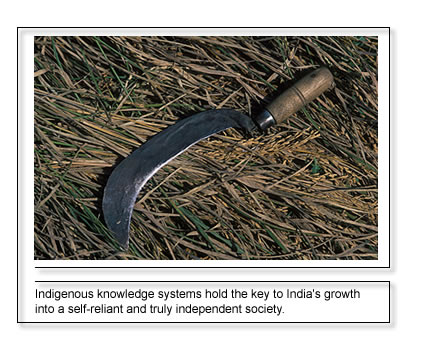
In India, there is a large reservoir of knowledge systems - technologies as well as trained craftsmen and scholars who possess knowledge in various branches of traditional Indian sciences and technologies. These span vast and varied areas like agriculture, architecture, metallurgy, metal working, health care systems and textiles, and also various theoretical areas ranging from astronomy and mathematics to grammar, logic and linguistics. In many of these sectors it is also a fact that knowledge prevails at various levels ranging from the classical scholars who may have a knowledge of textual material and manuscripts in Indian languages, to the Folk practitioners who have their training and skills as a living tradition of transmission of skills and knowledge.
Even today it is a fact, that in very many crucial and basic sectors, the vast majority of the Indian population is sustained by the knowledge, skills and material resources of the traditional sector. However, these systems have received very little by way of attention and even less by way of financial support or institutional help from the government. Even when traditional sciences or technologies are studied, it is often in the nature of the study of history or literature or "Indology" and almost never from the point of view of their contemporary relevance and potential. Moreover, appreciation of tradition is usually limited only to the aesthetic and decorative dimensions of the products of our tradition and not to their functional aspects or as living traditions that have relevance for today.
We believe that in order to evolve into a strong and a self-reliant nation we need to identify and build upon our inherent strengths and potential in varied areas. Our approach is based on the premise that these are not merely serving a decorative role and are not to remain as appendages to modernity or merely as reminders of a past glory. On the contrary they should, however, become the basis on which today's needs and requirements can be met.
Towards this end it is necessary to evolve a programme for the strengthening and revitalisation of varied aspects of Indian knowledge systems. This is the long term goal which our organisation is working for.
The CIKS methodology involves looking deep into the heart of these ancient knowledge systems to gain a strong understanding of their workings and rationale. The understanding and knowledge so gained is then leveraged to develop solutions that are practical and feasible in today's context.
We strongly believe that the future lies in understanding and harnessing the potential of indigenous knowledge systems and integrating them into the mainstream of scientific, industrial and everyday thinking. Only then can we build a strong and self-reliant society.
|